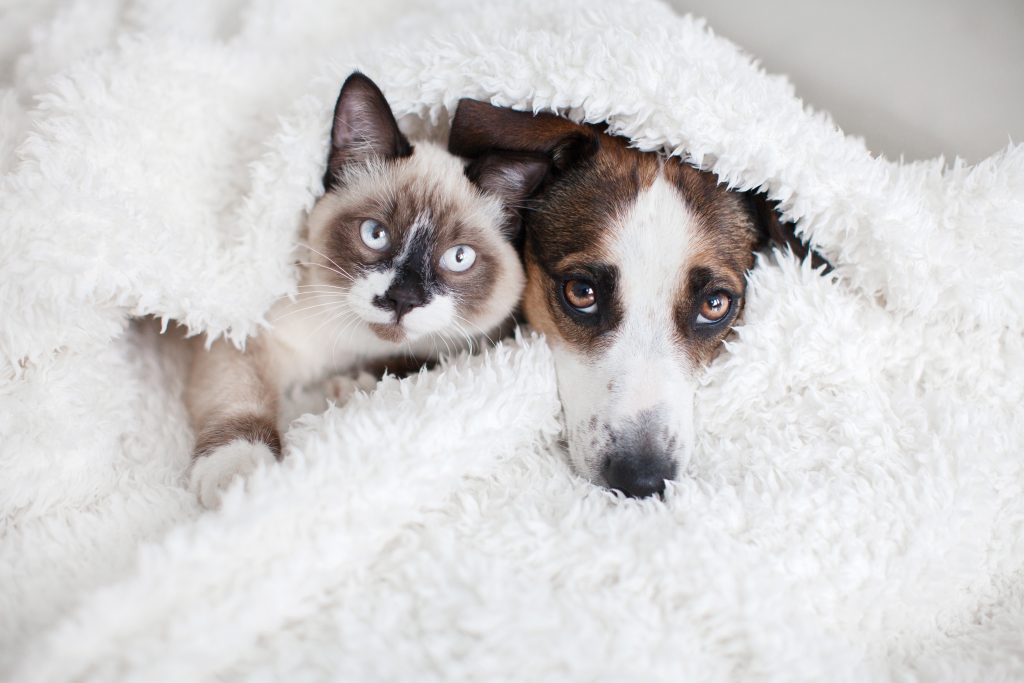General Pet Care Tips for the Winter
It’s cold and snowy in Portsmouth these days! Winter is a difficult time for pets. Special attention should also be paid to older animals, young puppies and animals with short coats. Pets require adequate shelter and warmth during the cold weather. If the temperature outside drops below 15 degrees F., any outdoor pets should be moved indoors. If an animal is shivering or refuses to play, this generally means that he or she is too cold. This animal should be brought indoors as soon as possible.
Here are some tips to keep your pets healthy and warm this winter
Cold Weather
- If you are cold, so are your dog and cat. Hypothermia and frostbite occur quickly in canines. On very cold days, limit time outdoors and walking to less than 15 minutes at a time. Consider a jacket or sweater for your canine friend.
Frostbite:
- Occasionally an animal is accidently left outdoors for an extended period of time. As a result, frostbite may occur. The most common areas for frostbite are the tips of the ears, paw pads, and the tip of the tail. The frostbite area should be bathed in warm water (not hot) for a few minutes and then please call us so we can examine your pet.
Paw Health is Important!
- Please check your dog’s paws regularly during the winter months. Snow and ice should be removed from the fur located between the toes. Damp paws should be thoroughly dried because moisture that accumulates between the toes can cause sores. De-icing chemicals and salt are common irritants. If these products are commonly used, your dog’s paws should be bathed regularly.
- Nail care is also important. In the winter months, trim your dog’s nails on a regular basis. Not only do long nails irritate a dog’s toes, they force him to walk on the backs of the paws, splaying his toes, creating more space between the toes allowing more snow to cling to the fur.
- Your pet may also experience cracked, sore pads, a common wintertime problem. The cracked pads are painful and can also cause lameness. This condition can occur in any breed but is often seen in larger dogs. Salt used for de-icing roads and sidewalks is often the cause. The salt dries the dog’s pads and causes them to crack. To prevent this condition, soak or wash your dog’s paws (with warm water) and dry them thoroughly when he returns home from the cold. You may also use a salve product made for this purpose on the paws.
Dry Skin:
- Pets often experience dry skin during the winter months. Lack of humidity tends to dry the skin. Frequent grooming (brushing) helps stimulate the production of oil from the skin glands.
Keep Cats Safe:
- During the cold weather, cats often take shelter under the hood of cars. A warm engine is a comfortable area for a cat to rest. When the car is started, the cat risks severe injuries from the fan belt or blades. If you have outside cats in your area, knock on the hood or raise it before you start your car in order to conduct a safety check.
Antifreeze Poisoning
- Antifreeze poisoning typically happens when antifreeze drips from a car’s radiator, where it is licked off the ground and ingested by a pet. Antifreeze and windshield washer fluids contain a product called ethylene glycol, which tastes sweet and has a taste that is attractive to both dogs and cats. Just a small amount of antifreeze consumed by a pet can cause irreversible kidney damage, leading to coma and death. Animals are often poisoned by licking up spills in the garage, on the driveway, or on the street. Ingestion of ethylene glycol causes central nervous system depression. Animals appear to be disoriented and in a stupor. Eventually a pet becomes comatose and unresponsive. Death results from kidney failure.
- If you suspect that your pet consumed even the smallest amount of antifreeze, don’t wait for symptoms to appear. This is an emergency and you should call us immediately. If it is not possible to obtain immediate veterinary care, induce vomiting and administer activated charcoal. This will reduce the amount of toxin that your pet’s body absorbs.
REFLECTIVE GEAR
- You can be active and safe during winter months walking with your dog. Highly reflective clothing and accessories for both you and your pet, such as reflective vests, reflective collars and leashes, detachable collar lights, light-up collars, high-visibility dog vests, head Lamps, and LED hats will keep both you and your pet safe in the darker evenings of winter!


